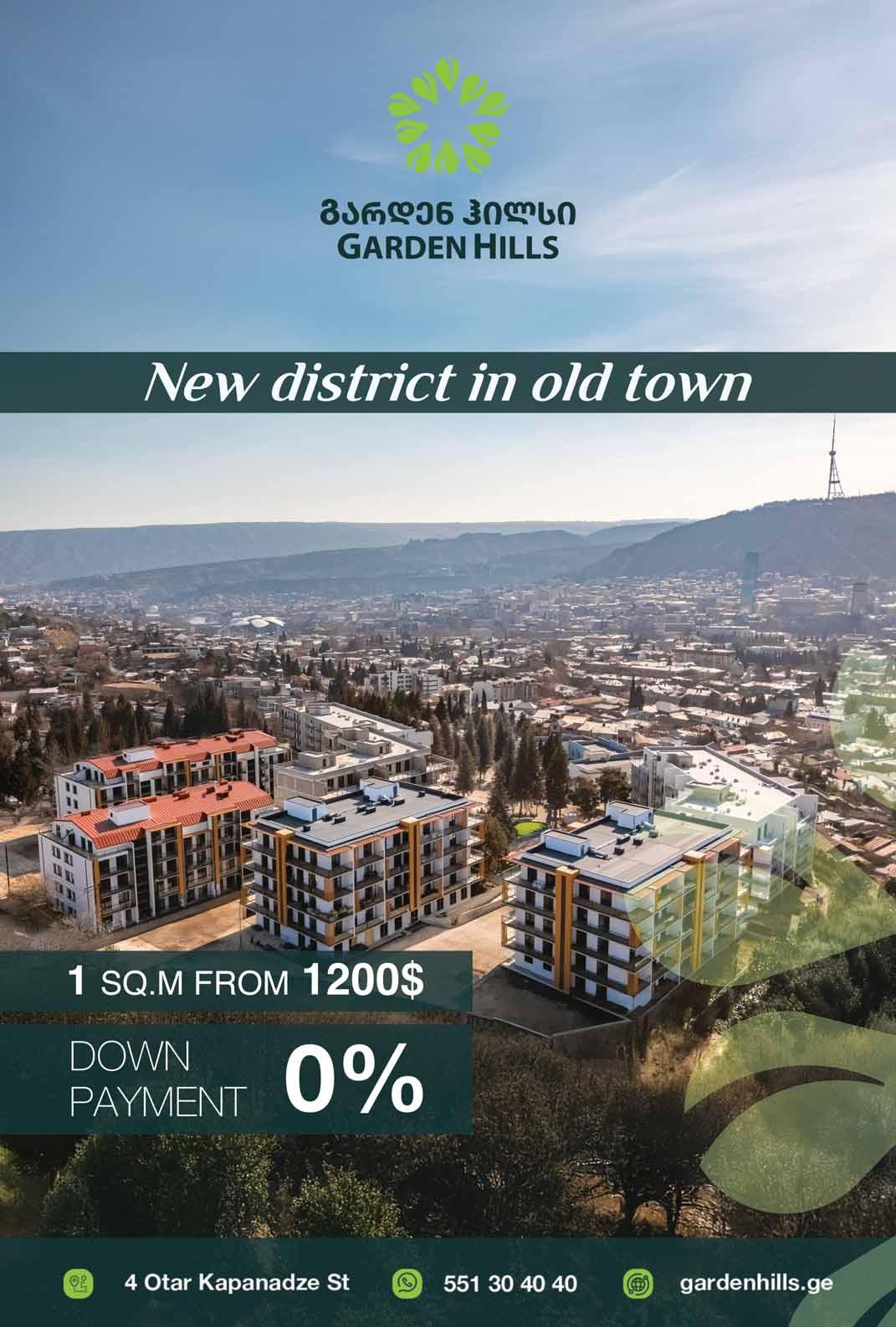FOCUS ON SERBIA
Serbian political analyst Aleksandar Djokic discusses the protests, Vucic (pictured), and political red lines for Georgia and Serbia PAGE
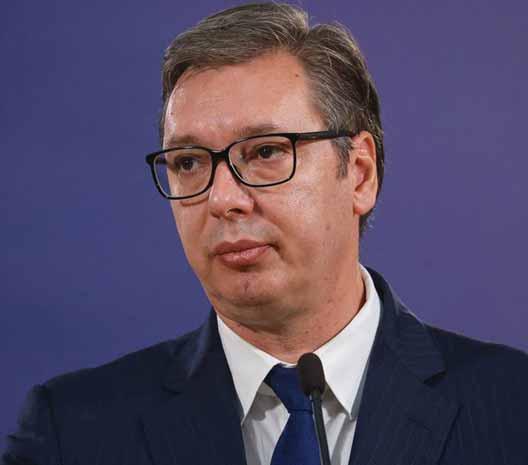
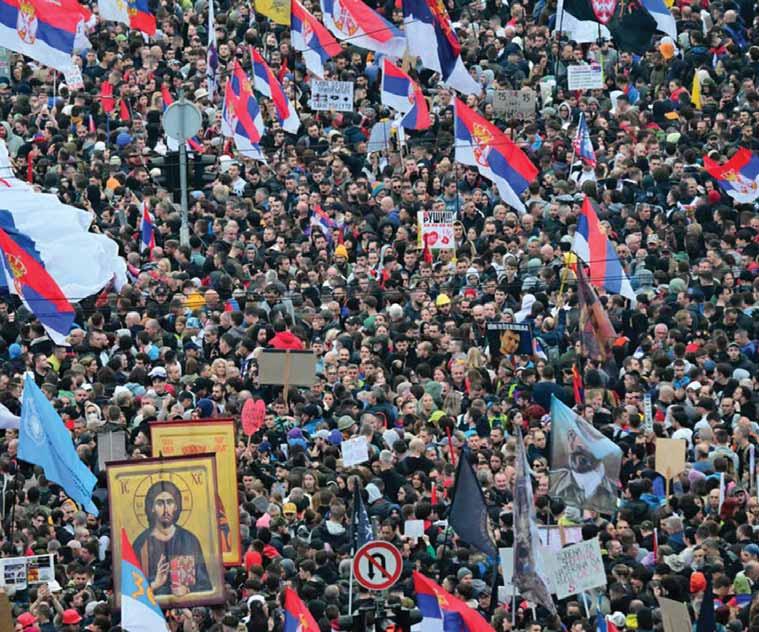

Serbian political analyst Aleksandar Djokic discusses the protests, Vucic (pictured), and political red lines for Georgia and Serbia PAGE


BY TEAM GT
The European Parliament has adopted a resolution on Georgia with amendments, with 490 votes in favor and 147 against.
The draft resolution, published on the Parliament’s website, reaffirms the European Parliament’s solidarity with the Georgian people and its unwavering support for their legitimate European and Euro-Atlantic aspirations and their desire to live in a prosperous and democratic country. The resolution highlights that these aspirations are expressed through mass protests that continue despite severe repression by the authorities.
The European Parliament states its continued readiness to assist the Georgian people in achieving these goals; it strongly condemns the violent crackdowns, arbitrary and politically motivated arrests without sufficient legal basis, and the systemic mistreatment of
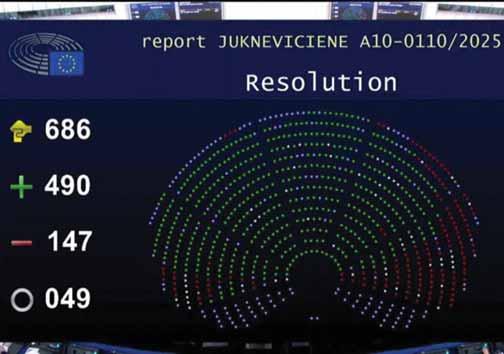
In this week’s issue...
Georgia Sees First SM Detention Case as Crackdown on Government Critics Intensifies
NEWS PAGE 2
Ukraine Latest: Ukraine under Fire as War Grinds on ahead of NATO Summit
POLITICS PAGE 3
Economy as a Key Pillar of National Security: Essence, Trends, Challenges. Part 1 BUSINESS PAGE 6
WB: Georgia Ranks 2nd Globally in 2024 Labor Productivity Growth
SOCIETY PAGE 8
Myth, Heritage, and Modern Art: The Masterpieces of Georgian Princess Salome Kobulashvili. Part 1
CULTURE PAGE 10
A Poem Beyond Borders: Mariko Kvaliashvili’s TATO Revives the Spirit of Baratashvili at the Tbilisi Opera
CULTURE PAGE 11



BY TEAM GT
On July 9, the Zugdidi District Court sentenced activist Rosto Zarandia to five days of administrative detention over a Facebook comment deemed insulting to a public servant. Judge Irakli Abshilava ruled that Zarandia’s post insulted Zugdidi City Hall employee Magdalina Todua. In the comment, Zarandia used the Megrelian words “Tvinge” and “Poncho,” which translate to “stupid.”
This marks the first known case in Georgia of detention for a social media “insult,” under new laws introduced by the ruling Georgian Dream party. Since February, insulting public officials or civil servants has been an administrative offense — one that, according to recent court practice, also covers online activity.
Zarandia’s case comes amid an escalat-
ing crackdown on critics of the Georgian Dream government. In recent months, opposition politicians, journalists, and activists have faced fines or short-term jail sentences for public or online comments.
On June 24, Tbilisi City Court fined Diana Gogoladze GEL 2,500 (approximately USD 920) for a Facebook comment directed at a police officer, also categorized as an insult.
Most recently, on July 7, activist Alki Kordzaia was sentenced to five days of detention after publicly confronting officer Bidzina Zhamerashvili, calling him “shameless” and “disgraceful.” Zhamerashvili is accused of giving false testimony in the case of 21-year-old activist Mate Devidze, who was sentenced to four and a half years in prison for allegedly assaulting police.
The growing number of such cases has sparked concern among civil rights advocates, who say the law is being used to silence dissent and intimidate critics of the government.
BY TEAM GT
ARussian court has sentenced Georgian citizen Gela Eradze to 14 years in prison in absentia for allegedly fighting as a mercenary in Ukraine, reports the Russian media, citing the Investigative Committee.
The Committee claims Eradze joined a Ukrainian armed group in early 2022, received military training, and took part in combat against Russian forces and those of the self-proclaimed Donetsk and Luhansk republics.
He was convicted under Part 3 of Article 359 of Russia’s Criminal Code, which

covers mercenary activities, and was sentenced to serve his term in a strict regime colony.
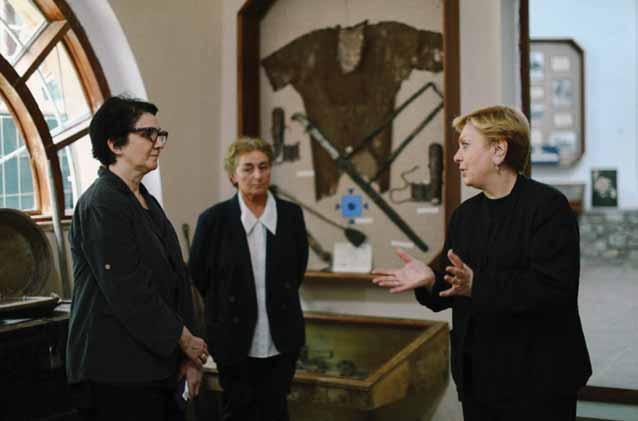
BY TEAM GT
Alarge-scale rehabilitation project for the VazhaPshavela House Museum in Chargali is set to begin, the Ministry of Culture of Georgia has announced. Culture Minister Tinatin Rukhadze presented the 2025–2027 rehabilitation plan during a recent visit to Chargali. She was joined by Lela Razikashvili, founder of the Vazha-Pshavela Foundation, along with senior officials from the ministry, including Dimitri Mujiri, Head
of Infrastructure Development and Logistics, and Maka Sokhadze, Head of Museums Management.
The project will encompass full rehabilitation of the museum, development and renewal of surrounding infrastructure, improved outdoor lighting, and the restoration and modernization of exhibitions. Conservation work and improved exhibit arrangements are also planned.
Upon completion, the Vazha-Pshavela Museum is expected to serve as a modern cultural and educational hub for the Mtskheta-Mtianeti region, equipped with updated infrastructure and enhanced visitor experiences.
Vazha-Pshavela (1861–1915) was one of
Georgia’s most revered poets and writers, known for his epic poems, deep philosophical themes, and celebration of nature and highland traditions. His works explore the tension between individual freedom and social norms, often drawing from the rugged beauty of the Caucasus Mountains.
The Vazha-Pshavela House Museum, located in his native village of Chargali in the Pshavi region, preserves his legacy through original manuscripts, personal belongings, and exhibits on his life and work. The museum offers a glimpse into both the poet’s creative world and the cultural spirit of the Georgian highlands.
BY TEAM GT
In an exclusive interview with Radio Liberty, US Ambassador to Georgia Robin Dunnigan sharply criticized a letter sent by the Georgian Dream leadership to former US President Donald Trump, describing it as “threatening, offensive, frivolous,” and noting it was received “very negatively in Washington.”
Ambassador Dunnigan expressed deep concern over the direction Georgia’s ruling party is taking, especially as the United States remains one of the country’s strongest allies.
“At a time when the United States is Georgia’s strongest supporter of its sovereignty, the steps taken toward isolation suggest that Bidzina Ivanishvili, founder of Georgian Dream, may be putting his personal interests above those of the country,” Dunnigan said.
She warned that Georgian Dream’s recent actions are damaging not only
bilateral relations but also Georgia’s broader international standing: “Georgian Dream’s actions have strained relations with its key partners — the United States, Europe, and the broader West — and have significantly harmed its reputation, particularly within the business community,” the ambassador stated. Her remarks come amid heightened tensions between Tbilisi and Western capitals over democratic backsliding, controversial legislation, and Georgia’s shifting foreign policy orientation.
BY TEAM GT
Irakli Nadareishvili, Deputy Minister of Economy and Sustainable Development, met with Han Jun, Deputy Director of China’s Civil Aviation Administration (CAAC), to discuss strengthening civil aviation ties between Georgia and China. Nadareishvili expressed interest in expanding cooperation and increasing the number of flights operated by Georgian and Chinese airlines. He noted that the recent introduction of visa-free travel has significantly boosted passenger traffic.
“Visa-free travel has played a key role in driving growth. We aim to add new routes and increase flight frequency, which will further enhance trade, economic relations, and tourism between our countries,” he said.
In 2024, 57,184 air passengers traveled between Georgia and China—a 45% rise compared to 2023. Currently, China Southern Airlines and Air China operate direct flights to Georgia. Air cargo demand is also on the rise, with growing interest from carriers on both sides.
The meeting was also attended by Givi Davitashvili, Director of the Civil Aviation Agency, and Zhou Qian, Chinese Ambassador to Georgia.

COMPILED BY ANA DUMBADZE
As the war between Russia and Ukraine enters its 129th week, both sides continue to suffer heavy losses, while the frontline remains largely frozen in many areas. However, the past seven days have seen a spike in aerial attacks, diplomatic tensions, and renewed concerns over global security and humanitarian conditions.
Russia has launched a new wave of missile and drone strikes across Ukraine, focusing particularly on energy facilities, military depots, and port infrastructure.
Ukrainian officials say more than 60 Shahed drones and over a dozen cruise missiles were fired at multiple regions, including Odesa, Kharkiv, and Dnipro. Ukraine's air defense systems reportedly intercepted the majority, though several critical facilities sustained damage.
In Odesa, a grain terminal was partially destroyed, raising fears about further disruptions to Ukraine's agricultural exports through the Black Sea. President Volodymyr Zelensky condemned the attacks, calling them “a direct assault on global food security.”
On the ground, Ukrainian forces continue limited counteroffensive operations in the eastern Donetsk and Luhansk regions. Ukrainian military command reports modest gains near the town of Kreminna, while Russian sources claim to have repelled several assaults in the area.
Ukrainian commanders are also warning of a potential new Russian offensive near Kupiansk, where troop concentrations and artillery fire have increased.
Military analysts suggest that Russia may be seeking to regain momentum ahead of the NATO Summit.
Remnants of the Wagner Group have been spotted near Belarus’s border with Ukraine, prompting speculation about renewed paramilitary involvement in the war. Belarusian authorities deny any hostile intentions.
The upcoming NATO Summit in Washington has placed Ukraine high on the agenda. President Zelensky is expected to attend and push for stronger commitments on air defense, ammunition supplies, and long-term security guarantees.
The United States and several EU countries have already announced new aid packages this week. Germany pledged an additional €1 billion in military support, while the US reaffirmed its delivery of long-range missiles and training assistance.
Volodymyr Zelensky took a call with Donald Trump last week that focused on joint weapons production and air defense. Zelensky is in urgent need of more Patriot interceptor missiles — the only effective defense against Russian ballistic attacks and a system only the US can authorize for export. Trump had spoken the day before with German Chancellor Friedrich Merz, who has proposed purchasing Patriots from the US to send to Ukraine. The developments were significant enough for Zelensky to describe the call with Trump as “the best conversation we have had during this whole time, the most productive.”
“We’re going to send some more weapons,” President Donald Trump said Monday of Ukraine. “We have to – they have to be able to defend themselves. They’re
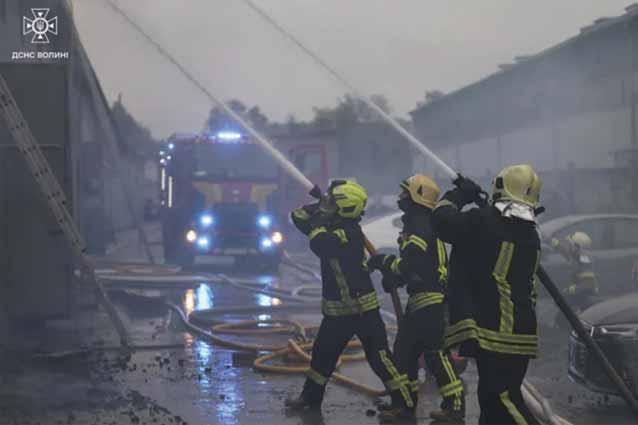
getting hit very hard.”
However, some Western officials are voicing concern over the sustainability of military support, given shifting political dynamics in key donor countries, particularly with US elections approaching.
The humanitarian situation remains dire in eastern and southern Ukraine. UN agencies report rising numbers of internally displaced persons and critical
shortages of medical supplies, especially in frontline towns.
A recent UNICEF report highlights the growing psychological trauma among Ukrainian children, many of whom have now spent over two years under the constant threat of violence.
As the war drags on with no diplomatic breakthrough in sight, both Ukraine and Russia appear determined to outlast the other. On Monday, Putin’s top diplomat
reiterated Russia’s most extreme demands. In an interview with a Hungarian newspaper, Sergey Lavrov insisted that the “underlying causes” of the war must be addressed, listing a series of sweeping conditions — among them the “demilitarization and denazification of Ukraine, lifting sanctions on Russia, rescinding all lawsuits against Russia, and returning the illegally seized Western-based assets.”

BY TEAM GT
During the final remarks of a European Parliament debate on Georgia, Lithuanian MEP Rasa Jukneviciene thanked the majority of political groups, “except a few consistently pro-Russian voices,” for backing Georgia’s European future. She expressed hope that the Parliament would adopt the report on Georgia with an absolute majority and called on the European Council and EU member states to advance sanctions against the Georgian regime.
Jukneviciene also appealed to the Danish Presidency of the EU Council to lead efforts among willing countries to pressure the Georgian government into holding new, free, and fair elections, describing this as the only viable path forward for the country.
However, her remarks and the broader report met with sharp criticism from Georgian officials. Davit Matikashvili, Chairman of the Georgian Parliament’s Committee on Procedural Issues, dis-
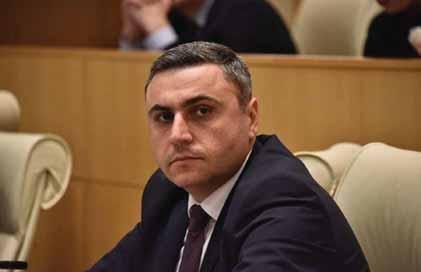
Davit Matikashvili. Source: exclusivenews.ge
missed the debate as political theater, claiming that Jukneviciene was “speaking to herself in an empty chamber.”
“What the public witnessed in the practically empty chamber of the European Parliament is shameful,” Matikashvili said. “Ms. Rasa keeps writing lie after lie and repeats them to herself. These
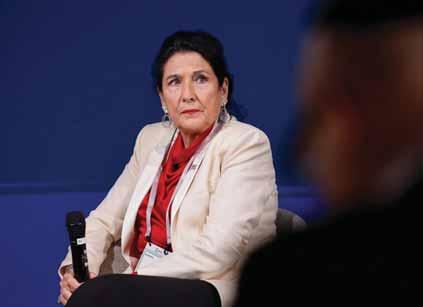
BY TEAM GT
Georgia’s fifth President, Salome Zurabishvili, has strongly criticized both participation in and boycott of the upcoming local elections, calling the entire process a manufactured illusion. In a pointed statement, she declared:
“Neither a campaign for participating in the elections nor a boycott suits us; if anyone in this country believes that local elections can be held, that is a great myth— I am certain they will not take place.”
Zurabishvili emphasized that Georgia’s political landscape is deeply fractured, with resources being wasted on internal division instead of unifying protest. “We are divided on both sides,” she said, lamenting the energy spent on what she described as a meaningless boycott campaign. “These efforts should be directed toward protests.” She argued that the ruling party, Georgian Dream, has strategically used the topic of elections to sow discord among the opposition and weaken resistance. “The opposition has been split, and the protests have been weakened. Our only strength is unity,” she warned. Zurabishvili portrayed the political
scene as a “theater of the absurd,” where both sides are caught in a scripted drama. She believes the elections are being used as a tool of manipulation and repression under the guise of democracy.
“There are criminal, mafia-like rules of deals and intimidation in the country. No citizen feels protected anymore,” she said, adding that the environment of fear, coercion, and financial pressure renders genuine elections impossible.
Zurabishvili noted that she is skeptical of the opposition parties that advocate for electoral participation, stating that they lack a clear strategy or real ambition to challenge the regime. According to her, such participation will not consolidate the parties or produce meaningful change.
At the same time, she dismissed boycott campaigns as equally ineffective, arguing that authoritarian regimes often manipulate even low-turnout scenarios to their advantage. “There is no example of a boycott being declared as some kind of victory,” she noted. “In today’s conditions, just as elections would be rigged if someone participates, a boycott can be rigged even more easily.”
In her view, the only path forward is through national unity—not campaigns or political maneuvering—but a collective stand that rejects both illusion and division.
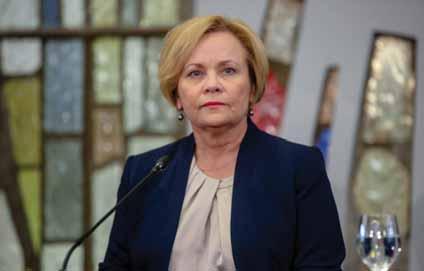
lies have neither legal nor political weight.”
According to Matikashvili, the resolution being discussed received significant criticism from MEPs and failed to reflect the political reality in Georgia. He said it misrepresented the status of former President Mikheil Saakashvili, calling
him a “convicted individual” found guilty by both Georgian courts and the European Court of Human Rights. He further asserted that there is no political persecution in Georgia and that those referred to as political prisoners are in prison due to their own actions.
Matikashvili also described current
President Salome Zurabishvili as politically irrelevant, claiming she no longer holds legitimate influence.
“The Georgian people do not yield to blackmail,” he concluded. “And that has been made clear not just by the people, but also by Rasa’s own colleagues in the European Parliament.”
Continued from page 1
It calls on the Georgian authorities to refrain from using force, to respect freedom of assembly and expression, and to repeal the recently adopted repressive legislation aimed at suppressing public dissent. It expresses particular concern over the growing number of political prisoners and once again calls for their immediate and unconditional release. The EU is urged to ensure effective and credible investigations into all acts of violence and to hold perpetrators accountable. The resolution also raises concerns about the lack of judicial independence in Georgia, where high-ranking judges affiliated with the ruling “Georgian Dream” party allegedly preside over politically motivated trials against peaceful demonstrators and critics of the government.
The resolution expresses the EU’s regret that the ruling “Georgian Dream” party failed to use the historic opportunity granted to Georgia as an EU candidate country to advance on the path of European integration, and notes that the overwhelming majority of the Georgian population still supports EU integration.
The European Parliament emphasizes that Georgia’s EU integration process has effectively stalled due to ongoing democratic backsliding and the falsification of the parliamentary elections in October 2024. It considers this a clear turning point toward an authoritarian regime, marked by the unlawful capture of state institutions and democratic safeguards, as well as the adoption of antidemocratic legislation that contradicts the core values and principles of the European Union. It echoes the European Council’s conclusions from June 27, 2024, which state that the current course of action endangers Georgia’s EU path, and urges “Georgian Dream” to return to democratic reforms and Euro-Atlantic integration.
The Parliament calls for immediate and targeted personal sanctions against Bidzina Ivanishvili, his family members, and his companies, and urges the EU to cooperate with other jurisdictions, particularly the United Kingdom, to freeze his financial assets.
The resolution reiterates the position that the political and constitutional crisis in Georgia can only be resolved through new parliamentary elections, to be held within the coming months under improved electoral conditions, with supervision by an independent and impartial electoral administration and
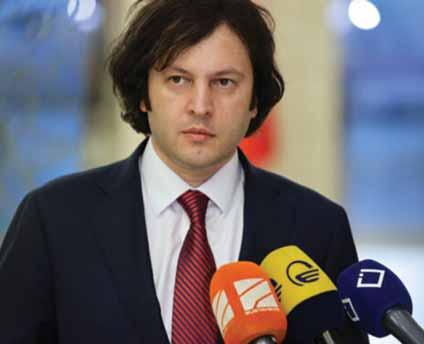
Prime Minister Irakli Kobakhidze. Source: FB monitoring by international and independent local observers, ensuring a truly fair, free, and transparent process that reflects the genuine will of the people.
According to the resolution, the European Parliament stresses that it does not recognize the “self-declared authority” established by the “Georgian Dream” party after the fraudulent parliamentary elections on October 26, 2024, and considers Georgia a state captured by the illegitimate “Georgian Dream” regime.
The document further expresses regret that Georgia has made no progress in aligning with the EU’s foreign, security, and defense policy recommendations and that its alignment with the EU’s Common Foreign and Security Policy (CFSP) remains notably low, at just 49%. It emphasizes that progress toward EU membership requires full alignment with the CFSP, in line with the expectations for all candidate countries. It regrets that Georgia does not participate in the EU’s crisis management missions and operations under the Common Security and Defense Policy, and notes that Georgia’s foreign policy misalignment leads to self-isolation. The repressive regime of “Georgian Dream” is said to worsen instability in the South Caucasus region and the Black Sea area.
GEORGIAN LEADERS
CONDEMN EUROPEAN
PARLIAMENT RESOLUTION AS "SHAMEFUL BLACKMAIL" Georgian officials have sharply rebuked
the European Parliament's latest resolution on Georgia, accusing Brussels of political interference and value distortion.
Parliament Speaker Shalva Papuashvili criticized the resolution—passed with 490 votes in favor, 147 against, and 49 abstentions—as evidence of a “confusion of values” in the EU. The resolution, among other points, calls for the release of imprisoned former President Mikheil Saakashvili. In a social media post, Papuashvili blasted the demand, calling Saakashvili a “Georgian dictator” implicated by the European Court of Human Rights in systemic torture.
"Confusion of values—this is all you need to know about the present-day situation in Brussels," he wrote.
Prime Minister Irakli Kobakhidze echoed the criticism, labeling the resolution “absolutely shameful” and accusing EU leaders of trying to coerce the Georgian public. He claimed the resolution amounts to “blackmail” for Georgians’ refusal to return Saakashvili’s United National Movement to power.
“The EU bureaucracy should take full responsibility,” Kobakhidze said at a press briefing, also accusing the EU of whitewashing abuses committed by Georgia’s previous government, including torture, media crackdowns, and territorial concessions.
“This is disgraceful,” he added. “These are the same people who now adopt shameful resolutions with shameful language.”
INTERVIEW BY VAZHA TAVBERIDZE
As mass protests continue to roil Serbia and Georgia, both countries find themselves walking a tightrope between democracy and creeping autocracy, with Moscow’s shadow looming large over both. Aleksandar Djokic, Serbian political analyst and former assistant professor at RUDN Moscow, spoke to RFE/RL’s Georgian Service to unpack what binds these two struggles, what sets them apart, and why geography, and Russia, still dictate so much of the political playbook in both capitals
WHAT WOULD YOU SAY ARE THE MAJOR SIMILARITIES AND DIFFERENCES
BETWEEN THE PROTESTS IN GEORGIA AND SERBIA?
Well, both Georgia and Serbia have hybrid regimes, somewhere between democracy and autocracy. Obviously, the Georgian regime has in recent years slid further into outright autocracy. The Vucic regime, we can say, still sits on the fence, maybe closer to Orbán’s model, because they are neighbors and regime partners in some sense. Autocracies, just like democracies, pick up tactics and tricks from one another.
The main difference, though, is one that cannot really be changed — geography. Georgia borders Russia, Serbia borders mostly EU and NATO countries. So there are red lines that Serbia’s regime simply cannot cross without risking sanctions, and those sanctions would really hurt, because the regime has no alternative source of growth or investment. That’s crucial. Serbia doesn’t even have access to the sea. When Lavrov wanted to fly to Serbia after Russia invaded Ukraine in 2022, he couldn’t, as neighboring countries closed their airspace. He was blocked. So in that sense, Serbia is enclosed. But that’s not entirely a bad thing: Serbia is enclosed by democratic, mostly peaceful neighbors, and trades with them. This “encirclement” sets clear limits: no regime can overstep.
Vucic, of course, learned the lessons of Milosevic’s downfall well: he was part of the Milosevic regime. He was Minister of Information in 1998–99, during the Kosovo War and the NATO bombing. So he saw first-hand what red lines not to cross. That’s why his regime is very careful — they won’t start wars, obviously, and they also avoid large-scale repression. Yes, there is repression, but it is limited, targeted: it hits student groups or protest organizers, mostly to scare people from joining. It’s more about intimidation than mass punishment. They don’t want a
Belarus scenario — mass arrests after protests, like in 2020.
SO, THIS DEMOCRATIC “ENCIRCLEMENT” WORKS AS A DETERRENT. BUT WHAT ABOUT RUSSIA’S INFLUENCE? WHERE DOES IT RUN DEEPER, SERBIA OR GEORGIA?
Good question. If we’re talking about hearts and minds, propaganda, then I’d say Russia’s footprint is deeper in Serbia. Georgia, after all, fought a direct war with Russia. For Georgians, Russia is the foreign power taking away parts of their territory. Serbia had almost the opposite experience. And you have to understand, while we know Russia’s policies in the 1990s were wrong, and things could have been handled differently, that resentment from the wars is still mostly directed at the West.
Of course, this needs to be nuanced. The EU and NATO are not the same in Serbian eyes. The EU gets mixed feelings, but if Serbia were truly close to joining, a clear majority would support it. The EU is seen as a source of wealth, investment, and development. People want that economic prosperity. But the resentment about the wars of the 90s lingers — the West is still blamed by many for those defeats, not Milosevic’s regime.
THE NOVI SAD PROTESTERS, THE THOUSANDS STILL COMING OUT INTO THE STREETS, ARE DEMANDING MORE DEMOCRACY IN THE COUNTRY. BUT AT LEAST SOME HARBOR SYMPATHIES TOWARDS RUSSIA. IS THAT A CORRECT READING OF THE SITUATION?
We have the liberal protesters, and alongside them we have nationalists also protesting. They are protesting together because all of them see that Vucic is doing something wrong. The liberals see Vucic as pro-Russian, anti-democratic, and that, under this regime, Serbia will never join the EU. The nationalists, on the other hand, see him as not tough enough on Kosovo, cooperating too much with the West, giving them resources or investments — exactly how Milosevic was seen before his downfall.
Part of society saw Milosevic as a bloody dictator, a war criminal; the other part saw him as a national traitor who never stood up to the West hard enough, always compromising and then capitulating. And all these people came together to protest him. They protested together, even if their views were basically irreconcilable.
For RussiaGeorgians, is the foreign power taking away parts of their territory. Serbia had almost the opposite experience
ABKHAZIA REGIONS.
And Russia also has gas leverage in Serbia. The gas contract has yet to be renewed. It was automatically prolonged for four months, because that’s in the contract, but a new deal hasn’t been negotiated yet. And, of course, there is also the propaganda leverage, because the regime presents itself to its own voters as very pro-Russian, very close to Russia. Putin always steps in — that’s leverage for Vucic’s electorate. For Vucic’s voters, it matters more what Putin says about Vucic than what Trump or Ursula von der Leyen say. They’ve been led to believe for 13 years now that Vucic and Putin are close, that they always support each other. This regime’s propaganda has drilled this in: that Vucic is a secret pro-Russian nationalist with a secret “Great Serbia” agenda, but he can’t show it too openly because then he’d be sanctioned or replaced by the West. So he has to pretend, “but his heart is with Russia.” That’s what they want the people to believe.
ALL THIS TALK OF COLOR REVOLUTIONS, FOREIGN AGENTS, WESTERN MONEY, COUPS — YOU KNOW THIS WELL, YOU WERE EDUCATED IN RUSSIA. HOW MUCH OF THIS COMES STRAIGHT FROM THE KREMLIN PLAYBOOK?

Florida to meet Trump? He was rejected, claimed he fell ill, flew back across the ocean, and then went straight to the Moscow parade a few days later.
WHAT’S THE REPUTATIONAL AND STRATEGIC COST FOR BOTH GOVERNMENTS, ESPECIALLY ON THE INTERNATIONAL STAGE?
The Vucic regime must pay attention not to use excessive force, or to use it too often, or to use it on a mass scale, because the world is watching — and those are the red lines I mentioned at the start. The regime must hold to that, while the GD regime probably has more of a free hand, more space to maneuver, because it’s attached to Russia at the moment. It doesn’t really have to care as much about Western opinion. It’s the Belarus scenario: also attached to Russia.
If
Russia weakens, Georgia has a better chance to set itself free
their best shot — the long game.
DO YOU SEE ANY LIGHT AT THE END OF THIS TUNNEL — FOR EITHER SERBIA OR GEORGIA? AND WHAT DOES IT DEPEND ON?
There are red lines that Serbia’s regime simply cannot cross without risking sanctions
It’s the same now. The student protest movement tries to avoid the ideological questions and focus on democracy, corruption, rule of law, replacing the Vucic regime, because there is no other way. Of course, these are liberal democratic values — European values: democracy, transparency, anti-corruption, rule of law, free media. All of this is what the EU wants to see in Serbia. These goals are not in contradiction with Serbia’s relations with the West, but they are not viewed geopolitically, are not seen as “we want to replace Vucic with a more pro-Western government” or “a more pro-Russian government.” But yes, there are these two camps inside the protest — sometimes they clash, sometimes they criticize each other, but in the end, they all protest together.
LET’S TALK ABOUT RUSSIA’S LEVERAGE: FOR SERBIA IT’S KOSOVO, FOR GEORGIA IT’S THE TSKHINVALI AND
For months now, Russian officials have been openly backing Vucic — they are the only ones openly framing these protests as some kind of color revolution organized by the West. No other big powers do that. China is neutral, not really involved, or maybe not that interested. They have a lot of investment in Serbia, and likely believe their capital is safe no matter who comes to power. So they don’t push this narrative. Inside Serbia, the regime itself uses this talk — color revolutions, foreign plots — but they don’t go as far as saying “the US is behind this” or “the EU is behind that.” Milosevic’s regime did that, as Lukashenko’s regime did later, but they were already in open conflict with the West and had nothing to lose. Here, the Vucic regime flirted with that narrative when the Trump administration started to weaken its soft power and cut USAID. For a short while, the regime pushed that line too, claiming the protests were funded by USAID, but they didn’t want to say “it’s the US,” or more, “it’s Biden.” They jumped on that bandwagon but got a cold shoulder from Trump’s side. The Trump administration didn’t care to actively engage in the Balkans, didn’t come out supporting Vucic, though they didn’t oppose him either. Remember when Vucic travelled to
LET ME ASK YOU SOMETHING THAT IN GEORGIA NOBODY CAN ANSWER YET, BUT MAYBE YOU CAN FOR SERBIA: HOW FAR IS THE REGIME WILLING TO GO TO HOLD THE LINE? AND HOW REAL IS THE FEAR AT THE TOP THAT IF THEY GIVE UP, THEY’LL FACE THE SAME TREATMENT THEY’RE GIVING THE OPPOSITION NOW?
Dissent in Serbia is very high, and the people are really, really angry. There is a desire for revenge when the regime falls, for these people to be prosecuted. We didn’t see that strongly enough after 2000. Back then, some transitional deals were made with parts of the Milosevic regime. But this time, we don’t see a desire for deals. That’s one of the key points: this protest movement doesn’t want to cooperate with the opposition, doesn’t trust them enough, thinks maybe they are also controlled by Vucic. There’s huge suspicion of the Vucic regime, and they don’t want a deal, not like 2000 when Milosevic fell. They really want to deconstruct this regime as much as possible. But Vucic is buying time. The strategy is to wait this dissent out, hope the protest fizzles. The next regular elections aren’t due until 2027. That’s about a year and a half. So the regime thinks that’s
Well, I see that this protest movement in Serbia is really broad, socially. It connects a lot of people — from the capital, from the provinces, different layers of society, different ideologies. It’s really a mass movement. I haven’t seen anything like it since 2000. I think it will ultimately succeed. I can’t say exactly when, this year or next, but this dissent isn’t going away, and I don’t think the regime has any instrument to raise its own popularity. It’s not winning any contest — not economic, not political, not geopolitical. It can’t find any big “victory” to sell to society.
So I think we are moving towards a kind of liberation of Serbia, slowly or more rapidly — I can’t say exactly when. The protests are very intense, but I can’t name a date.
AND FOR GEORGIA?
I’m more pessimistic, simply because Georgia is so connected to Russia — economically it now depends mostly on Russia, especially with this sanctions circumvention. Obviously, people in the regime are making money from that. If Georgia were geographically positioned differently, I’d believe the same for Georgia as I do for Serbia. But Georgia will have a better chance only if Russia is somehow defeated — maybe in Ukraine. Or maybe sanctioned harder by the EU and the US. If Russia weakens, Georgia has a better chance to set itself free.
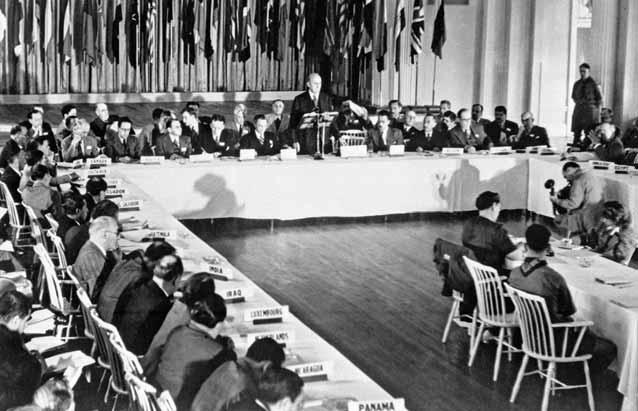
BY VICTOR KIPIANI, GEOCASE CHAIRMAN
We have repeatedly discussed a unified and comprehensive model of national security. Considering the complexity and multifaceted nature of modern relations, it was established in a so-called broad sense, with the widest possible scope. In other words, security today is no longer limited to military and related aspects alone - it equally extends across virtually every layer of state and societal functioning.
At the same time, despite the aforementioned multidimensionality and comprehensiveness, the economy is considered a priority direction and a system-forming foundation of effective security. Such prioritization is, perhaps, not a particularly novel discovery. Without an economically self-sufficient and resource-based national order, discussions about the integrity, effectiveness, and unity of national security have never lacked relevance - neither in the near nor in the relatively distant past. However, in the process of a fundamental transformation of international relations and the shift toward a new balance of power, the interconnectedness of the economy and security requires renewed observation and assessment. Today, we find ourselves precisely facing such a necessity, when traditional challenges - wars, armed conflicts, recessive phenomena, external and internal extremism, and others - are now joined by the first global economic war, economic nationalism, and techno-autocracy. Precisely in light of this reality, economic security has emerged as a leading and
defining theme within the broader framework of security. It is a fact that the implementation, projection, and advocacy of state and national interests become virtually impossible under the conditions of an empty “pocket.” It is equally impossible when this “pocket” seemingly belongs to you - the country - but is, in fact, controlled by a foreign hand.
This observation, though not particularly novel, fully reflects Georgia’s current reality. However, I will return to that a bit later. For now, let us focus on a few general trends that are especially relevant to us.
At the global level, economic relations were subordinated to global security interests immediately after the end of World War II. The Bretton Woods Agreement and the new economic order it established serve as a clear demonstration of this. Two main pillars formed the foundation of that order: (a) greater globalism, and (b) the dominance of values in politics.
Since the 1980s of the previous century, the control of trade and investment flows through the unification of rules of conduct has come under the attention of major and regionally influential countries. Particular attention was given to the free movement of goods, people, and ideas - a process that began with the well-known Uruguay Rounds and culminated in the establishment of the World Trade Organization. The primary goal of the World Trade Organization itself was to evolve into a system of interconnected globalism, as envisioned by the Bretton Woods framework. It was also considered a doctrine that democracy and capitalism were to be seen as a unified concept and that these two components would organically support each other in expansion and strengthening. It is clear that the evolution of this process was shaped by a number of other
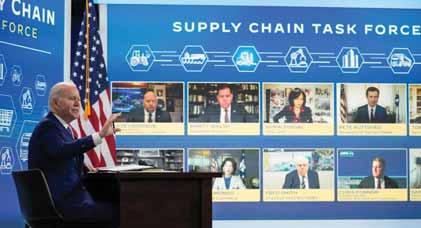
What is especially noteworthy here is the new understanding of China’s growing influence and the resulting economic security shaped by that influence. I will briefly add that when discussing influence, “domination” and “leadership” are two distinct categories - a distinction clearly observable in the case of China. Specifically, if we look at the period up to the present, the goal of official Beijing has not been to dismantle the existing order, but rather to adapt it to its own interests - by maximizing its influence from within that very order.
(2) The distribution - a kind of diffusion - of power between state and nonstate actors, with the latter’s influential voice becoming increasingly prominent.
(3) The excessive monetization of foreign policy objectives, examples of which are now abundantly and openly on display.
(4) The intertwining of corporate and oligarchic interests with state policy to such an extent that, as a result of this “fusion and blending,” it becomes increasingly difficult to distinguish one from the other.
ciency - the openness of the system also brings with it a certain degree of vulnerability. Moreover, the greater the level of global interconnectedness and interdependence, the more significantly vulnerability increases.
The response to these challenges was the establishment of the Supply Chain Resilience Council in the United States and the development of the Industrial Defense Strategy. In order to strengthen the country’s economic security, a number of other measures were also undertaken - some justified, while others remain highly debatable. I have discussed several of them in previous publications and will not dwell on them here.
Also noteworthy is the adoption of the so-called CHIPS & Science Act by the United States in 2022, which envisioned a $50 billion investment to support domestic semiconductor manufacturing. In fact, for the past half-century, this was the most ambitious state initiative for domestic production. Its declared goal was to strengthen the supply chain by reinforcing an economic sector critical to national security.
significant initiatives - mostly guided by an Anglo-Saxon leitmotif. For example, the activation of the G-20 group aimed, as much as possible, to establish a conflict-free global economic ecosystem. However, neither it nor any other project was able to save the global economy from the 1999 financial crisis. At this point, it’s also worth recalling the wellknown 2008 crisis, which likely sparked early American skepticism toward the liberal economic order and laid the groundwork for the demand for a Trumpstyle political leader.
Clearly, alongside the unification of rules, the key actors did not forget their own interests - which, under institutionally rational conditions of “containment and balance,” is also a normal occurrence. As a result of events already well known to the reader, the above-mentioned control has now taken on an overtly protectionist content, with leading economic systems openly embarking on a path of autarky (nationalism). At the same time, relatively benign concepts such as the “trade balance,” “direct foreign investment,” and the “balance of payments” shifted from the classical commercial dimension to the security dimension: in other words, they were “securitized”becoming instruments of pressure and coercion for foreign purposes (weaponization).
From the same perspective, the global and subregional routes for the supply and delivery of mineral resources fundamentally transformed in their purpose. As a result, access to and control over certain geographic areas became critical. In this matter, some act in a way that practically reminds one of the 1884-85 Berlin Conference, which, during its discussions on Africa, laid the foundation for the concept of “spheres of influence.” It is also worth noting that obtaining such control today spans multiple dimensions — military, economic, institutional, and “soft power” - and now, new control is also exerted through multinational corporations. The agreement on mineral resources between the United States and Ukraine is a clear indicator of this “new wave” in the process.
...Which is one of the most critical components of economic security, it is essential to highlight several “order-forming” factors. In particular, the growing trend of economic nationalism, which is naturally accompanied by restructuring in accordance with a unified security system, was preceded by:
(1) A significant shift in global economic opportunities toward Asian countries - particularly China and India.
(5) The absolutely unique role of technooligarchy in contemporary domestic or foreign policy, which lays the foundation for an entirely different form of governance.
(6) The increased confidence and proactiveness of Middle Powers in the emerging “disorderly order.” In the foreseeable future, it will become increasingly difficult to force such countries to relinquish their “hard-earned” autonomy, while their tendency toward hedging and balancing will remain relevant.
(7) The rise of regional centers, often under the influence of regional hegemons or even driven by their claims over a regional “sphere of influence.” At the same time, alignment in interests and risk assessments outlines both a new understanding of “regionalism” and emerging contours of interregional integration.
(8) The place of the Global South in the global economic "polyphony," which, in my opinion, still does not possess a homogeneous character. In this regard, the absence of a unified concept or handwriting should be attributed to the following main factors, namely: Is the “Global South” considered with or without India and China? And (b) Is the “Global South” considered with or without the Middle East?
In my view, the answer to both questions is negative.
(9) Updating the economic security agenda by further deepening cooperation in international organizations (from BRICS to the so-called “Asian NATO”).
This trend is likely to intensify in light of the definitive end of the “disorderly order” and the unipolar world. Objectivity also requires noting that this trend, intentionally or unintentionally, is supported by the current US administration, which is moving from hegemony to hedging money.
As I have already said, these and related factors help us to better analyze security in a broader sense and to better understand the mechanisms that, to a greater or lesser extent, balance the relevant risks across Georgia.
To illustrate this point, I will mention a few key aspects related to the global supply chain.
Specifically, having adequate control over such deliveries and supplies has two practical advantages:
(1) That the adversary or/and competitor is unable to obtain information valuable to the target country's security, and (2) That the adversary or/and competitor is unable to damage the critical sectors of the target country's economy. Such risks are particularly relevant under a liberal economic system, where - alongside competitiveness and effi-
A separate matter is how effective such a set of measures will prove to be in ensuring truly invulnerable security in the economy. Achieving real results largely depends on the government's ability to respond swiftly and efficiently, as well as on clearly and accurately defining the objectives.
In this same context, it is also important to consider, on the one hand, the degree of the United States' integration into the global economy, and on the other hand, the behavior pattern of its main competitor - China - especially under conditions where both countries are so deeply economically interdependent. Since we mentioned the US-China economic relationship and related security issues, it is also worth briefly addressing the particular characteristics of China's behavioral patterns. Their specificity poses a special challenge not only for the United States but also for other countries in terms of neutralizing threats originating from China.
First and foremost, when discussing Chinese specificity, it is important to highlight the approach based on the principle of the so-called "comprehensiveness." The essence of this principle is that:
(1) The promotion of national and economic security interests is served not only by the combination of human and technological resources, but also by the fact that:
(2) Based on the so-called "principle of comprehensiveness," the acquisition of necessary information for Beijing is the responsibility of all segmentswhether governmental, business, military circles, or the diaspora. This approach is fundamentally different from that of the West, where the collection of relevant information is the exclusive responsibility of relevant official institutions. Moreover, according to China's strategic approach, if the creation and development of a particular technology is not possible using domestic resources, acquiring it from foreign sources - by any means - is considered permissible. The emphasis on 'any means' is explained by the fact that, following 'a century of humiliation' at the hands of the West, the primary goal of the People's Republic of China is to use all possible methods in pursuit of 'national rejuvenation'." Ultimately, such practice established by China conceptually aligns with the notion of 'comprehensive national security'. Moreover, it is deliberately and indiscriminately directed toward key sectors of the economy such as artificial intelligence, quantum computing technologies, synthetic biology, semiconductors, aviation equipment, green technology, robotics and automation, nuclear technologies, etc.
To be continued in next week’s Georgia Today and online at georgiatoday.ge.


Anything to get kids off their screens. Fortunately, up here in Svaneti this is not too hard: they’re such outdoor people, most of them, in this beautiful, rural, mountainous village.
My wife and I received a fooseball table as a gift from an international church in Tbilisi quite a few years ago. It quickly became a staple ingredient in the frequent kids’ clubs we host here, moving
from an upstairs room to the new covered gazebo outside, to the cafe building, then back in the house for the last few winters and to the gazebo every summer. It’s remained popular all these years, with ages from about six through high school and young adults. We’re glad that the local young people have a place to hang out away from home, just to socialize, have fun and be themselves. Unsupervised, but we’re just a few steps away if need be.
Board games… we have Scrabble in both English and Georgian, and Monopoly (current favorite) in Georgian, with its streets all to be found in Tbilisi. This
game is helping them learn to read and follow rules, cooperate with buying and selling of properties, cope with the good or bad luck of the dice, and work with money and math. Want to own Rustaveli or Chavchavadze Avenues? Now’s your chance.
Scrabble had its first ever iteration in Georgian at my initiation, in about 2008, when I lived in Ushguli for two winters teaching English and learning about that village’s culture. We had frequent power cuts then, some lasting days or even a week or more. What to do when your favorite Turkish evening soap opera isn’t available because the TV is out?! There was exactly one generator in the whole village, fueled by diesel, and no one had the luxury of buying the stuff just for the privilege of watching young, beautiful, rich people in the country west of us scheme and ruin their lives away.
By happy chance, my host family, the Ratianis, had a tablecloth with a grid of large squares on it, about two inches on a side. Georgian, like English and all of the languages of Europe, is written in a straight line, unlike, say, Korean, which has clusters of letters, or the writing systems of China, Iran, the Arab countries and Israel, for example. So you can make crosswords with it. We did some brief textual analysis to determine the relative commonness or rarity of each letter, as is proper with Scrabble, and started paying. Great fun.
Now, all these years later, there is an official Georgian Scrabble game available in toyshops and bookshops here.
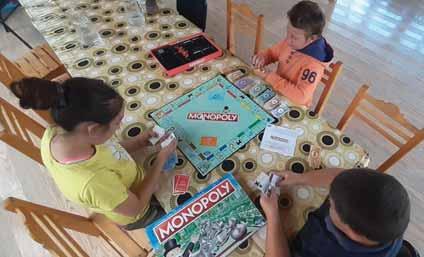
We bought this, along with Monopoly, as soon as we found it. Not having children of our own, we love hosting them from the village. Board games are experiencing something of a revival since Covid set in, about which I can only be glad.
Other games I like, such as Taboo, need adapting as well as translating for every language, because they are very languagespecific. Georgian does not have a very large target population, compared to, say, German, French or Mandarin, so it must wait its turn. But the games I’ve mentioned are a positive sign, whether they bring enough financial return or not.
Frisbees are another experiment of mine, and I recently brought back several of them from Canada. Boomerangs I’m still learning how to throw, before unleashing the children on them and having them get lost in a field somewhere. But frisbee is already taking off, as they learn how to throw AND catch one. It’s a very sports-minded community.
Then there’s the whole, 8 by 12 meter,
multi-section American-built playground which we were only a channel for the donating of, and about which I’ve already written here. Installed on the grounds of the school with no problem or paperwork (“Tony’s one of us”) and received with great joy last summer, it is also hugely successful, school in or out, all seasons.
Life can be so serious, with so much pressure to work or study hard, to get ahead (of everyone else), and so much bad news on all sides! Kids, just come and play, while you can, while you want to. Dare I say that play is also learning? This is important. Enjoy.
Tony Hanmer has lived in Georgia since 1999, in Svaneti since 2007, and been a weekly writer and photographer for GT since early 2011. He runs the “Svaneti Renaissance” Facebook group, now with over 2000 members, at www.facebook.com/groups/ SvanetiRenaissance/ He and his wife also run their own guest house in Etseri: www.facebook.com/hanmer.house.svaneti
BY TEAM GT
The World Bank (WB) has published the 2024 results for global labor productivity. Labor productivity is measured as the level of GDP per employed person, adjusted for purchasing power and constant prices.
The WB says labor productivity in Georgia increased by 10.4% in 2024, surpassing 56,608 international dollars. This double-digit annual growth places Georgia second in the world after Guyana, and first in Eurasia and the Eastern
Hemisphere. In terms of labor productivity progress over the 21st century, Georgia ranks in the top three globally:
• Guyana saw a 786% increase,
• China follows with 506%,
• Georgia is third with a 340% increase in labor productivity over the past 24 years.
In contrast, EU member states show alarmingly low growth. In 2024, labor productivity growth in the European Union was below 1%, and countries like Iceland, Ireland, Austria, Italy, and Finland even saw a decline.
The World Bank explains: “Labor productivity is used to assess a country’s economic capacity to create

and maintain decent employment opportunities with fair and adequate pay. Productivity gains from investment, trade, technological progress, or changes in work organization can enhance social protection and reduce poverty, thus lowering vulnerable employment and inwork poverty.”
It further notes:
“GDP per employed person is a key metric to monitor whether a country is progressing toward the Sustainable Development Goal (SDG) of promoting sustained, inclusive, and sustainable economic growth, full and productive employment, and decent work for all (SDG Indicator 8.2.1).”
BY NUGZAR B. RUHADZE
Elene Abashidze is 102 years old—vigorous, sharp-minded, and remarkably active. She plays the piano and sings almost professionally. Just a few weeks ago, she stood on the stage of the Tbilisi Concert Hall like a seasoned performer, captivating the enthralled audience with her vocal talent. She is unbelievably amazing! And that’s not all that makes her so important and lovable.
Elene Abashidze is also a prominent scientist. She graduated from the Geography and Geology Department of Tbilisi State University with a major in Hydrology. In her first dissertation (Candidate of Sciences), she addressed the significant issue of Karst—a distinctive type of landscape formed by the dissolution of soluble bedrock, most commonly limestone, by water. This process creates unique landforms such as sinkholes, caves, and underground drainage systems. Her doctoral dissertation, completed in 1967, focused on the hydrotechnical and hydrodynamic mechanisms of Karst formation in carbonate rocks. These highly scientific terms might sound a bit esoteric, but the essence is this: our lady of genius has made a mon-
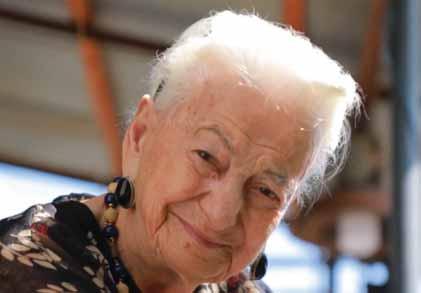
umental contribution to world science. For her achievements, Elene Abashidze was recognized by the American Biographical Institute and awarded the title of Woman of the Year among female scientists worldwide. She was noticed and nominated for this prestigious award as one of the individuals believed to make a lasting global impact—people who matter not only because of their past accomplishments, but also for their enduring and valuable scientific ideas
that will shape the future. Her first publication, which appeared in the Bulletin of the Geographical Society in 1946, explored the use of Karst in the energy sector. Abashidze was the first scientist to challenge the long-standing Dissolution Theory, which had been widely accepted for over two centuries. She conducted indepth studies on the role of water velocity in the solubility of rocks. Her powerful experiment, which lasted 250
days, provided the American Biographical Institute (which researches the lives and contributions of scientists globally) with the grounds to name her Woman of the Year and include her among the 100 Most Outstanding Scientists of the Planet.
Here’s why her experiment was so groundbreaking: due to the thrusting and drying of the Earth's crust, many hairline cracks form in limestone deposits that accumulated on the seabed. Over time, these cracks expand due to rain and other environmental effects, creating karst forms and cavities. Abashidze artificially replicated these cracks and passed distilled water—mimicking rainwater—through them, studying how water velocity affects rock dissolution.
She discovered that in a period of 50 years, a hairline crack can widen by 2.5 cm if the water pressure gradient is 1. This means that if the pressure is greater, more cavities will form, and the rate of dissolution will increase.
Over the last two hundred years, numerous reservoirs were constructed for hydropower generation—but many of them were built erroneously, resulting in catastrophic floods. Eventually, humanity began to move away from large dam construction. In Georgia, where the terrain lies in the seismically active Alpine fold zone, the risks of earthquakes must also be taken into account. Fortunately,
there is an alternative to large dams: small power plants based on the principle of watermills. Georgia has about 2,000 rivers with a permanent water supply. These small hydro plants can generate even more energy than large hydroelectric power stations. They require neither massive construction nor vast areas—just a power station at the end of a river’s flow, with no harm to the landscape. So why are we so hesitant to revive old, abandoned plants? Why is there such urgency to destroy our landscapes with massive dam projects? Who benefits from this? These are the questions Elene Abashidze raises—questions that demand immediate answers. There is no doubt: the current achievements and groundbreaking discoveries of our fellow citizens must not go unnoticed. These are among our nation’s most valuable contributions and deserve to be preserved and celebrated.
Elene Abashidze’s extraordinary scientific legacy will forever be recorded in the annals of world science and permanently archived in both the American Biographical Institute and the Library of Congress of the United States. It’s no wonder that the idea of a Nobel Prize for Elene Abashidze arises when one seriously reflects on the depth and brilliance of her scientific triumphs. Shall we pursue it in earnest? I would.
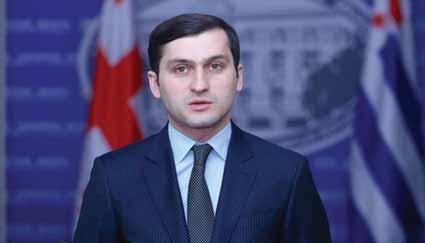
BY TEAM GT
On July 7, former Chairman of the Adjara Government — Tornike Rizhvadze (served 2018–April 4, 2025) — was admitted to Sagarejo Geohospital after sustaining a gunshot wound to the chest, according to the Ministry of Internal Affairs. Medical staff confirmed the bul-
let damaged only his lung, and his condition was described as “serious, but stable” under intensive care.
Following emergency surgery, Rizhvadze was transferred that same day to Tbilisi’s First University Clinic, where treatment continued. Clinic Director Levan Ratiani later reported “positive dynamics”: the traumatic–hemorrhagic shock was resolved, ventilator settings were simplified, and the patient could respond to commands and perform simple tasks.
On July 9, Rizhvadze was transferred to a hospital in Turkey at his family’s request. Clinical Director Lali Turdzeladze assured that his condition remained stable and ventilator support continued.
Police investigations suggest the shooting occurred at the Sagarejo home of Aleksi Akhvlediani, head of Georgia’s Maritime Transport Agency, where a Glock pistol was allegedly negligently stored. Prosecutors say Rizhvadze retrieved the weapon on the night of July 6 and shot himself with it. As a result, the incident is being probed under Article 115 (incitement to suicide) of the Criminal Code, and Akhvlediani was charged under Article 238 for negligent firearm storage.
The Prosecutor’s Office formally indicted Akhvlediani, who was released on 30,000 GEL bail on July 9. The penalty for such a charge carries up to three years in prison. Akhvlediani was dismissed from his office the same day.
Ahead of his resignation on April 4, Rizhvadze had led efforts to develop industrial zones and tourism in Adjara. He remains in critical but stable condition, with medical professionals maintaining cautious optimism as investigations proceed.

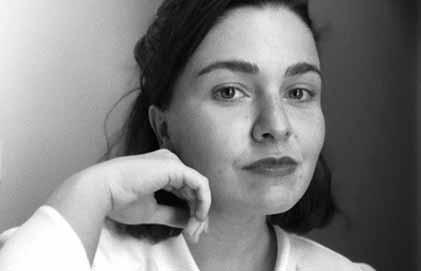
Mariam Bitsadze. Source: FB
Georgian Filmmaker Mariam
with her Short Film
BY TEAM GT
Georgian director Mariam Bitsadze, currently studying in the joint Master’s program of ECAL (Lausanne) and HEAD (Geneva), has been selected for the Film Foundry section of the Locarno Film Festival with her short film Sous la table, a program dedicated to showcasing bold and promising new voices in European cinema.
The film was made in just three weeks and is composed as a single continuous shot. It was created during an intensive workshop in Cluj, Romania, under the
guidance of renowned Romanian director Radu Jude. The project was also awarded ECAL’s Jacqueline Veuve Prize, given to a student whose work has made a significant contribution to the school’s artistic identity.
In addition to the screening, Mariam was also selected as one of the participating artists in BaseCamp Locarno - an international creative residency and laboratory that brings together emerging talents from around the world during the festival.
Mariam’s debut film The Feast premiered at the Toronto International Women Film Festival and went on to win main awards at film festivals in Belgium, Turin, and Tbilisi.

BY IVAN NECHAEV
In a climate where sound is increasingly policed and art is made to answer to power, the decision to play music becomes an act of defiance. On August 7, 2025, the Georgian experimental platform TSA Music will launch a new series, TSA: in transmission, at Berlin’s Silent Green Kulturquartier — a former crematorium turned artistic haven. This is no ordinary concert series: it is a broadcast of resistance, a
transmission of sonic memory, and a strategic cultural relocation. For Georgia’s experimental musicians, Berlin is not just another European city. It is a refuge, a stage, and, increasingly, a necessity.
TSA: THE ARCHIVE THAT BECAME A LIFELINE
Founded in 2019, TSA (which stands for “Transmission Sound Archive”) began as a digital platform devoted to mapping the emergent and often-overlooked topography of Georgian experimental sound. What started as an online space
of discovery — interviews, mixtapes, archival links — has since evolved into something far more urgent: a cultural ecosystem.
From the beginning, TSA positioned itself not merely as a cataloger of music but as a catalyst. It gathered fragmented local scenes — from ambient producers in Kutaisi basements to improvisational jazz performers in Tbilisi warehouses — and stitched them into something resembling a sonic narrative. By 2024, this archive began taking on physical form through events, workshops, and concerts. But just as TSA was expanding
into the real world, the real world began closing in.
A NATION THAT CLOSES ITS EARS
Georgia in 2025 is no longer the tentative democratic experiment that once captured the world’s hopeful gaze. Mounting censorship, surveillance of artists, suppression of LGBTQ+ spaces, and the erosion of cultural autonomy have all rendered independent artistic initiatives increasingly precarious. For platforms like TSA, the barriers are no longer just logistical. They are existential.
In this context, TSA: in transmission is not a festival. It is a diaspora in sound.
The decision to launch in Berlin — a city synonymous with post-wall cultural freedom and subterranean creativity — is both symbolic and strategic. TSA is exporting what Georgia threatens to silence. It is safeguarding what could be lost.
TSA RECORDS: RESISTANCE ETCHED IN VINYL
The Berlin edition presents three intergenerational and interdisciplinary collaborations, each pairing prominent figures from Georgia’s electronic and experimental music scenes. Mess_Montage x Reso Kiknadze, Anushka Chkheidze x Daniel Adikashvili, Natalie Beridze x Tamriko Kordzaia — these duets are not merely performances; they are dialogues across time, genre, and methodology. This is not a program designed to entertain. It is designed to provoke, mourn, and insist.
In tandem with the event, TSA announces the launch of TSA Records, a vinyl imprint dedicated to preserving and distributing recordings from each collaboration. These won’t be promotional souvenirs — they’re intended as archival documents. In an era when
digital files vanish with regime change and memory holes deepen with every algorithmic purge, vinyl is a political medium. It resists deletion. It demands shelf space.
Each pressing will carry the tactile weight of a time, place, and urgency that cannot be replicated. In this sense, TSA: in transmission is also a historical intervention: music as both message and monument.
AND ECHO
The concept of “transmission” in TSA’s new title is layered. It is at once technical (broadcasting sonic ideas), political (spreading cultural resistance), and intimate (passing down a lineage under threat). The phrase evokes Cold War-era shortwave radios — Georgians huddled to hear Radio Free Europe through the static — and also speaks to the present: an algorithmic age where culture is both disseminated and surveilled.
Berlin may be the first station in this transmission, but the implication is clear: this is the beginning of a series, a relay of resilience across borders. TSA is reimagining the very idea of a national music scene — not as geographically fixed, but as diasporic, mobile, and irreducibly collaborative.
The involvement of TBC Bank indicates that even within constrained national contexts, alliances for cultural freedom can still be forged. But the deeper truth of TSA: in transmission lies elsewhere. It is a bet on the idea that sound, once freed, becomes unstoppable. It can carry messages across oceans, slip through censorship, and gather new meaning in new ears. In a world where borders harden and speech tightens, TSA: in transmission offers something radical: music as contagion rather than containment. The signal is live. The resistance is audible. The transmission has begun.
BLOG BY TATJANA MONTIK
Salome Kobulashvili is a direct descendant of the last Georgian king, Erekle II. But I would have never known this if it weren't for a chance encounter. As fate would have it, this princess turned out to be... my dentist! And not just mine: a highly renowned dentist in Georgia, she once treated Eduard Shevardnadze and even Alain Delon himself!
One day, while at Salome's office for an appointment, I admired an elegant, Art Nouveau-style shelf for flowers. Casually, Salome remarked, "If you like such things, you'll surely appreciate my work," and took several miniature figurines from her desk drawer. All of them were made of stone or glass and metal: a bust of a woman in an oriental turban, a bathing beauty, a swan princess, sleeping beauties, and many others. These pieces seemed like discoveries from some ancient treasure, perhaps even artifacts from ancient Colchis! It turns out all these precious items are the creations of her delicate hands, and for her art, Salome uses... a dental drill with various attachments. I had never heard of works of art being created with ordinary medical equipment!
"RETURNING HOME"
In response to my delight, Salome invited me to her exhibition, "Returning Home." It was 2021, the height of the pandemic. The vernissage took place, in my opinion, in one of Tbilisi's most impressive buildings, the Academy of Arts, also known as Arshakuni House.
The oriental halls of this palace, adorned with myriads of mirrored tiles, accentuated the piercing splendor of Salome's works, making them glow like treasures from fairy tales! There were countless guests, most of them friends and acquaintances of the artist. When we approached Salome to express our admiration, I couldn't resist asking why the exhibition had such an unusual name, what "returning home" meant. To this, Salome casually replied, "The thing is, this palace is our family home." These words were followed by an invitation for a conversation that would stun me no less than the artist's works. However, four years passed between her invitation and my visit: the pandemic and the war in Ukraine not
only reshaped Salome's and my plans, but also altered the agenda for the entire planet.
THE RESIDENCE OF A MODERN PRINCESS
And so, finally, I had the good fortune to visit the residence of a modern princess. It's no palace, but an atmospheric apartment in a Stalin-era building in the Vake district, where every object and every photograph breathes living history.
In the spacious, cozy living room, Salome's artfully illuminated works are displayed on a grand piano, while the walls are adorned with the entire family history in photographs, featuring the noble faces of the Kobulashvili lineage, beginning with the last Georgian king. I carefully examine these faces, eager to learn about Salome's connection to Erekle II.
"My great-great-grandfather Evgeny, Erekle II's grandson, was the viceroy in Kakheti. And in 1902, Evgeny, along with his young wife, bought Arshakuni Palace at auction for 36,000 gold pieces," Salome recounts. This was followed by her captivating account of the incredible intertwining of her family's history.
Before the palace came into her greatgreat-grandfather's possession, the building was in complete disrepair. The Armenian merchant who built it never got to live a single day in the house, peacefully passing away right after its completion. After purchasing the palace, the new owner brought in the best craftsmen not only from Georgia, but also from Persia, Italy, and England, to restore the building. They transformed the palace into a true work of art, divided into two wings, executed in Oriental and Western European styles. The palace ended up costing ten times its purchase price—500,000 gold pieces! That's how wealthy Salome's ancestors were!
Salome explains, smiling, "The thing is, my great-great-grandfather gave their family home to his recently married sister. Who knows, perhaps that's why fate generously rewarded Evgeny with a huge fortune? He received a colossal inheritance from his aunt, Princess Orbeliani."
ROMANTIC INTRIGUES AND FATEFUL DECISIONS
According to contemporaries, Liza Orbeliani was a young lady with typical Oriental features, petite, fragile, and exceedingly charming. However, the princess
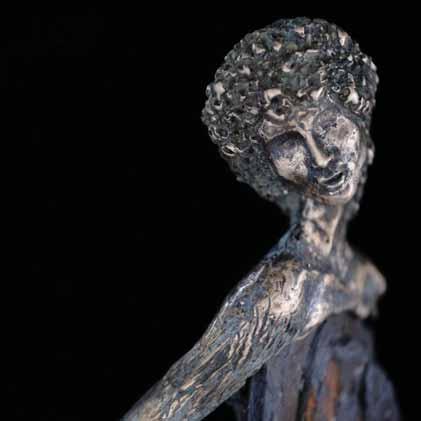
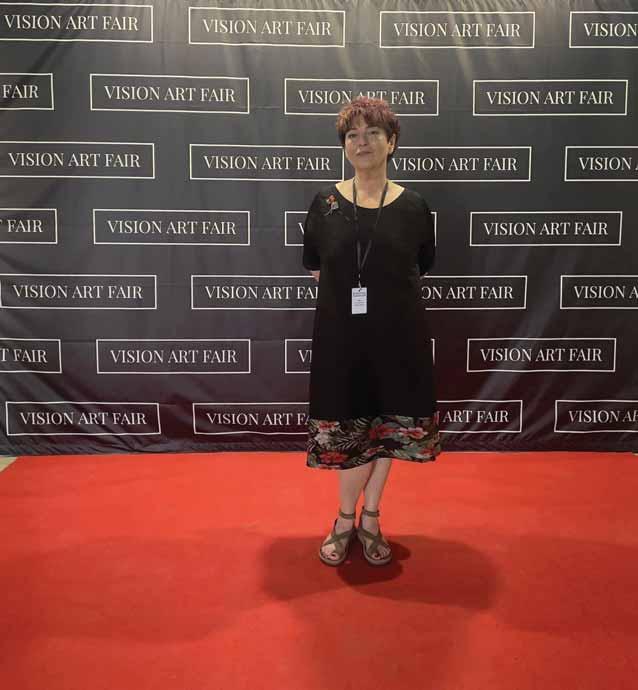
was unlucky in her marital life: she ended up marrying a gambler, a spendthrift, and a womanizer, David Davidov, who served in a dragoon regiment. Around this time, General-Field Marshal Prince Alexander Baryatinsky, a close friend of Tsar Nicholas I, was transferred to the Caucasus due to his somewhat improper behavior. Baryatinsky, who belonged to the highest Russian aristocracy, was known primarily for facilitating Russia's final conquest of the North Caucasus and the capture of Imam Shamil, the main leader of the North Caucasian highlanders.
The arrival of such a distinguished person as Prince Baryatinsky caused a real sensation in Tbilisi, and all the Georgian nobility and army went to pay him homage. "And so Liza Orbeliani's husband asked his wife to also go to the Prince to beg for some position for him," Salome recounts. "The princess indeed went for an audience with the GeneralField Marshal, but she asked him for something completely different: 'If my husband comes to you and asks for anything, give him nothing!'"
They say Prince Baryatinsky fell madly in love with Liza (she was 25 years his junior!), summoned her husband, and asked him how much money he wanted for his wife. And Davidov named a price to the prince. That is, he sold his wife to the Russian prince! A wild scandal ensued, but Baryatinsky took the princess with him, married her, and introduced her at the imperial court in St. Petersburg. Liza appeared before the Russian Tsar all in white lace, and he exclaimed, "And all

this fuss over this 'beauty spot' (a faux mole) in milk?"
Then the Russian prince and the Georgian princess were married in Belgium. There is even a legend that Shamil himself made them a lavish wedding gift. Afterwards, the newlyweds went to France, and soon Baryatinsky passed away. His widow, according to Salome's grandmothers, entered a monastery. "I don't know how plausible the monastery story is, but I know for sure that when Liza Orbeliani passed away, according to her will, all her enormous prop-
erty was distributed between my greatgreat-grandfather Evgeny Kobulashvili and another descendant of the Orbeliani family."
The story of Prince Baryatinsky's marriage so intrigued me that I started searching for details online. I found versions that differed from Salome's account. Upon learning this, Salome remarked, "I know nothing about other versions. My story is our family history."
To be continued in next week’s GT and on georgiatoday.ge

On the evening of July 8, a genre-defying musical work took to the stage of the Tbilisi Opera and Ballet Theater — TATO, a two-act "musical poem" by Georgian composer Mariko Kvaliashvili, inspired by the life and legacy of one of the nation's most enigmatic cultural figures, Nikoloz Baratashvili (1817–1845). Combining operatic solemnity with folk pathos and pop sensibility, Kvaliashvili’s piece walked the tightrope between reverence and reinvention. It was a spectacle not only of Georgian identity but of an evolving musical nation in search of new mythologies.
Known by his affectionate nickname
“Tato,” Nikoloz Baratashvili occupies a near-mythic role in the Georgian imagination — a tragic Romantic genius who died young (at 27) and left behind a slender but incandescent body of poetry. Born into aristocracy but living in imperial exile, his verses became synonymous with spiritual anguish, national longing, and metaphysical beauty. In the 19thcentury Georgian context — under the weight of Russian domination — Baratashvili symbolized a thwarted liberation, both personal and political. His bestknown poem, "Merani", is often compared to Byron’s Childe Harold, with whom Baratashvili shares a haunting posthumous fame.
Kvaliashvili’s TATO does not seek to dramatize a single work. Instead, it stages the life of the poet itself as a metaphysical opera, tracing his journey from cra-

dle to grave in twelve stylized scenes, populated by historical and imagined figures who oscillate between sacred ritual and showbiz spectacle.
From the very first notes, TATO makes its boldest statement: this is not opera in any conventional sense. Nor is it popera, or a musical. It is rather a hybrid oratorio, moving between idioms with deliberate intensity. Think of it as an Eastern Orthodox Jesus Christ Superstar refracted through the aesthetics of national folklore, post-Soviet stadium ballads, and the stylistics of Georgian ritual music.
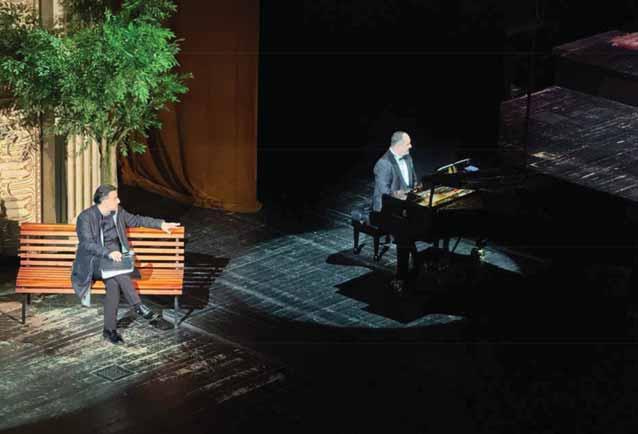
PUBLISHER & GM
George Sharashidze
COMMERCIAL
DEPARTMENT
Commercial Director: Iva Merabishvili
Marketing Manager: Natalia Chikvaidze
EDITORIAL DEPARTMENT:
Editor-In-Chief: Katie Ruth Davies
Journalists: Ana Dumbadze
Vazha Tavberidze
Tony Hanmer
Nugzar B. Ruhadze
Erekle Poladishvili
Ivan Nechaev
Mariam Razmadze
Layout: Misha Mchedlishvili
Photographer: Aleksei Serov
Mariko Kvaliashvili — herself a composer well-versed in sacred, choral, and theatrical music — has composed 21 new vocal numbers for this production. These were delivered by a constellation of performers drawn from radically different traditions. Opera soloists from the Tbilisi Opera (including Marika Machitidze, Sulkhan Gvelesiani, and Tamaz Saginadze) lent dramatic gravitas, with clear phrasing and resonant lyricism. Pop stars, including Eka Kvaliashvili and Giga Abesadze, brought an earthy immediacy to scenes of romantic and patriotic conflict. The Gori Women’s Choir, under the precise direction of Teona Tsiramua, added an otherworldly choral shimmer, especially in liturgical sequences evoking Baratashvili’s existential solitude.
Folk ensembles and choirs such as Shvidkatsa, Akhali Bana, Sagalobeli, and Kashueti Cathedral Choir evoked the organic polyphony of Georgian spiritual culture.
What could easily have collapsed into an aesthetic cacophony instead became a kind of a collage. This was achieved largely thanks to director Andro Enukidze, who approached the staging with reverent stylization. Each scene unfurled like an icon painting in motion: dreamlike tableaux combining archaic costumes (designed by Vano Chelidze), ritualistic gestures, and bursts of emotional intensity. Certain scenes were given operatic
International Relations & Communications
Sofia Bochoidze E: sbochoidze@georgiatoday.ge
Website Editor: Katie Ruth Davies
Webmaster: Sergey Gevenov
Circulation Managers: David Kerdikashvili David Djandjgava
ADDRESS
22 Janashia Str. Tbilisi, 0179, Georgia
heft through the use of choral layering and sacred motifs, resembling fragments of vesper services or medieval Sharakans. Elsewhere, love scenes were treated with a lighter tone, stylized in the mode of 20th-century chanson or even Georgian estrada ballads.
One of the most compelling musical strategies was the use of oriental ornamentation and folk microtonality in moments of spiritual hallucination or ecstatic vision — a subtle nod, perhaps, to the poet’s entrapment in a geopolitical corridor between East and West. Choreography, too, was ornamental. The "Abkhazeti" Dance Ensemble presented stylized historical forms, which deepened the sense of mythic time. Particularly striking was the use of oriental dancer Elena Chikhladze, whose solo appearance evoked a Byronic vision of the exoticized Other, filtered through Romantic imagination.
TATO is not simply a play or an opera. It is a collective effort to synthesize the fragments of Georgian identity in popcultured sonic form. In this sense, it joins a small but growing number of works — from Zurab Nadareishvili’s opera And It Was Evening… to Nino Janjgava’s liturgical compositions — that seek to break down the barriers between sacred, folk, and theatrical traditions in Georgian music. In a moment when many national theatres seek to “modernize” heritage by borrowing globalized aesthetics, TATO chooses a different path. It amplifies the local and dares to imagine a form of musical theatre where opera, pop, prayer, and history sing together in polyphonic unity.
Tel.: +995 32 229 59 19 E: info@georgiatoday.ge F: GeorgiaToday
ADVERTISING &
SUBSCRIPTION
+995 577 72 52 61
E-mail: marketing@georgiatoday.ge
Reproducing material, photos and advertisements without prior editorial permission is strictly forbidden. The author is responsible for all material. Rights of authors are preserved. The newspaper is registered in Mtatsminda district court.
Reg. # 06/4-309
